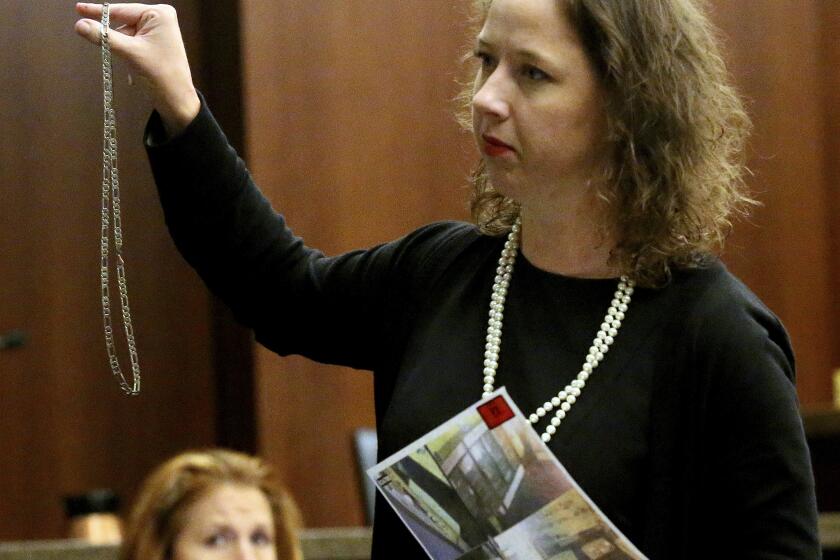Farmers Take to the Water in WTO Protest
Led by angry South Korean farmers, thousands of demonstrators Tuesday marched in the streets here, skirmishing with riot police who prevented them from walking -- or swimming -- to the Hong Kong Convention and Exhibition Center to protest the World Trade Organization’s ministerial talks.
On a cool overcast afternoon, several thousand people, banging drums and chanting anti-WTO slogans, reached Victoria Harbor about half a mile from the site where delegates from 149 nations are meeting this week. With their path cut off by cordons, dozens of South Koreans threw themselves into the water, one by one, in an apparent bid to swim to the wing-shaped building.
Their action appeared to catch authorities by surprise. Police boats arrived soon after and officers hoisted the farmers from the water. No serious injuries were reported.
“It was freezing, a lot colder than I thought,” said a shivering Cheong Yoon-chae, 45, who was among rice growers who complained that a further opening of agricultural markets could devastate South Korean farmers.
Protests continued today, and police in riot gear used pepper spray and batons to drive back the farmers.
During the WTO’s last ministerial meeting two years ago in Cancun, Mexico, a 55-year-old South Korean activist stabbed himself to death to protest the effects of global trade.
About 1,300 South Koreans arrived here during the last two days for the protests, which they vowed to keep up until reaching the convention center, one way or another.
Delegates at the WTO session, who are struggling to keep talks alive amid a rift over rich nations’ farm subsidies and tariffs, weren’t shielded completely from protests.
Inside the convention center, about 40 representatives of nongovernmental organizations displayed signs expressing concerns about the effect of the WTO and liberalized trade on individuals, the environment and democracy.
Despite the protests, WTO negotiators got down to business on the first full day of talks. It didn’t take long for the European Union and the United States, the two largest parties to the talks, to square off over food aid to poor countries.
In a panel discussion, EU Trade Commissioner Peter Mandelson took aim at Washington’s food assistance program that sends corn, wheat and other commodities to poor nations.
Mandelson said such aid distorted trade and protected U.S. farmers. He called on Washington to make cash donations instead.
U.S. Trade Representative Rob Portman said the EU’s “obsession” with food aid was misplaced, saying there were more important priorities in the talks.
U.S. officials, for their part, have been hammering the EU to offer a stronger package of farm tariff and subsidy cuts, action that many developing countries are demanding from the EU and the United States.
The discord over farm policies has all but guaranteed that this latest round of WTO talks, aimed at helping developing countries, won’t produce a broad agreement on new global tariffs and trade rules that the WTO had hoped would occur in Hong Kong. The WTO in effect has until the end of 2006 to craft a trade accord under the so-called Doha round of talks.
Some of the statements and behind-the-scenes meetings Tuesday suggested that negotiations would get tougher in the coming days. Farm groups from Japan, Europe, South Korea, India and 10 African countries issued a news release calling for more protection from free trade. More than 100 developing nations in the WTO were moving to strengthen their coalition.
Still, U.S. trade officials in Hong Kong said there were some encouraging signs. One of the issues that hasn’t become bogged down involves so-called trade facilitation. At the moment, there are no global trade rules governing express shipments. Nor are there uniform practices for posting shipping regulations or the paperwork required for companies entering foreign ports.
Agreeing on these rules probably would benefit ports such as Los Angeles and Long Beach, and cargo-handling firms.
On this set of procedures, the United States has already come to terms with countries including India and Uganda, said Matthew Rohde, a deputy assistant U.S. trade representative.
However, new global standards on trade facilitation wouldn’t occur if delegates failed to agree on an overall accord.
One of the more sensitive issues in the talks involves short-term visas for service workers wanting to work in the U.S.
American trade officials say they have no plans to offer changes on this issue, which is particularly important to India, home to a large engineering and professional workforce.
Indian delegate Amit Mitra said he was holding out hope for greater flexibility in this area.
He said U.S. action wouldn’t hurt American trade officials’ hopes of gaining more access to India’s banks, insurance companies and other services.
More to Read
Sign up for Essential California
The most important California stories and recommendations in your inbox every morning.
You may occasionally receive promotional content from the Los Angeles Times.










